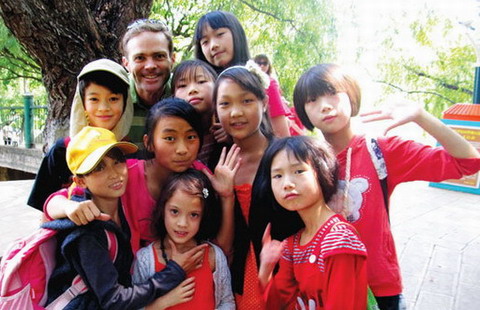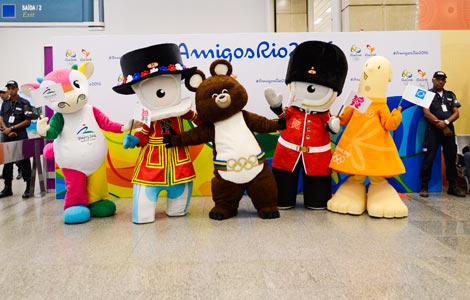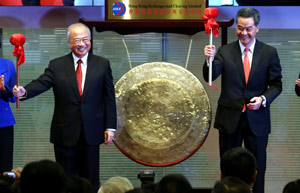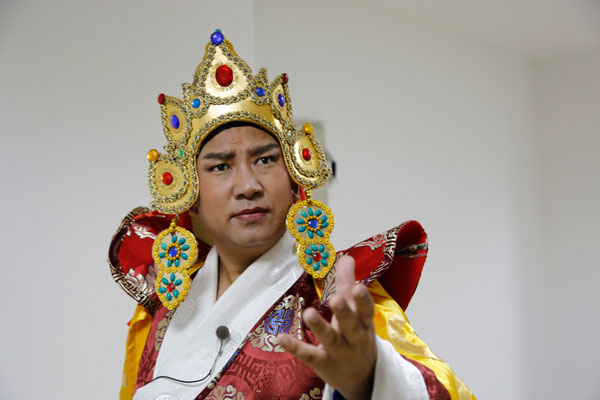Practitioners adapt old operas to fit modern lifestyles, tastes
Updated: 2014-11-21 15:23
By Phuntsog Tashi and Palden Nyima in Lhasa(China Daily USA)
|
||||||||
|
Palden Wangchuk, the leading man in the newly adopted opera Choegyar Norsang and the famous Tibetan opera performer of the Tibet autonomous region, is drilling before go on to the stage. Da Qiong / China Daily |
Changes aim to keep traditional art alive
Traditionally, a Tibetan opera take several days to perform.
Palden Wangchuk, a leading Tibetan opera performer, believes that is one reason the art is in danger of dying.
"Performers don't have time to perform an opera for several days, nor do the viewers have the time to watch for several days," he said.
As one of the pioneers who aim to update the centuries-old folk art and ensure its continuation, he has set out to modernize the style.
"The ancient operas were formed in accordance with the needs of the ancient people, and the operas performed now should also meet the needs of modern people", said Palden Wangchuk, who also serves as deputy head of the Tibetan Opera Troupe of the Tibet autonomous region.
"The duration of an opera is shortening both in the countryside and in the cities, and this is an inevitable part of development."
In Palden Wangchuk's view, keeping the vigor and vitality of Tibetan opera requires reducing their duration and creating new operas that satisfy modern viewers.
During the traditional Shoton Festival this summer, Palden played the title role in King Norsang - a new adaptation of one of the eight great classical Tibetan operas.
"Traditional operas take several days to finish the whole performance, while the duration of the adaptations has been reduced to less than two hours", said Phurchung, who wrote the shortenedversion.
"Adaptation is a difficult process to both keep the integrity of the story and fulfill the expectations of the audience," Phurchung said. "But we think it is worthwhile."
Sonam Tsetan, a Lhasa resident, watched the summer performance of the adaptation.
"Without getting tired or feeling bored, I watched the whole of King Norsang. I had a fun time," he said.
In 2013, the Tibetan Opera Troupe began adapting and modernizing the eight great classical Tibetan operas, and have vowed to finish the project within three years.
"Tibetan opera is included in the world's intangible cultural heritage. I hope Palden Wangchuk will become a driving force to lead many future generations to pass down this age-old precious heritage," said Thubtun, a well-known Tibetan comedian. "He is a hardworking man."
- India plans high-speed rail project with China
- S. Korea to test-transport Russian coal import via DPRK port
- Dozens take refuge from Japan quake aftershocks
- S. Korea holds drill in islets disputed with Japan
- Yingluck mulls over returning to politics
- French, British banks press EU to revise bank reform plans

 Sports moments of the week: Nov 17-23
Sports moments of the week: Nov 17-23
 42nd American Music Awards held in Los Angeles
42nd American Music Awards held in Los Angeles
 A retrospection of righted wrongs
A retrospection of righted wrongs
 Top 10 kinds of foreigners in China
Top 10 kinds of foreigners in China
 Anxious Ferguson waits for grand jury's decision
Anxious Ferguson waits for grand jury's decision
 Mascots from Olympic, Paralympic games arrive in Rio
Mascots from Olympic, Paralympic games arrive in Rio
 Rio 2016 mascots combine Brazilian fauna, flora
Rio 2016 mascots combine Brazilian fauna, flora
 China's boxer Zou Shiming defeats unbeaten Thai
China's boxer Zou Shiming defeats unbeaten Thai
Most Viewed
Editor's Picks

|

|

|

|

|

|
Today's Top News
China's interest-rate cut shows willingness to stimulate growth
LA mayor touts city's ties to China
Wall St ends at records on central bank action
US admiral sees balance in US-China relationship
New York leads way in boom in real estate
Hagel resigning as US defense secretary
80% of China's rich aspire to overseas education
US aids in return of economic fugitives
US Weekly

|

|








